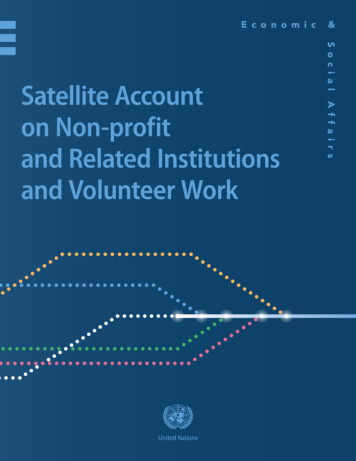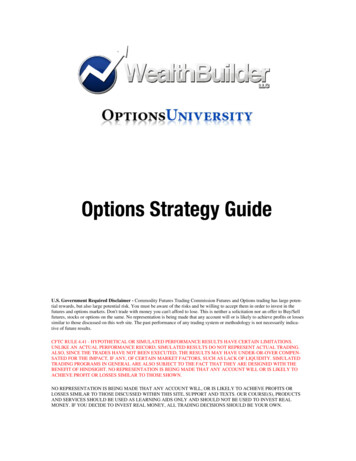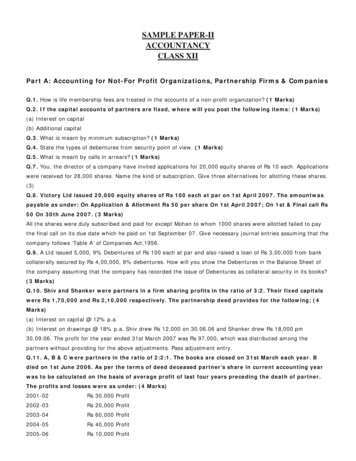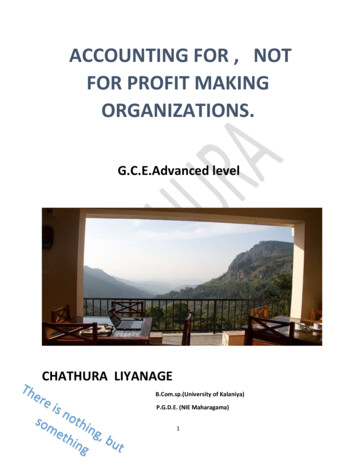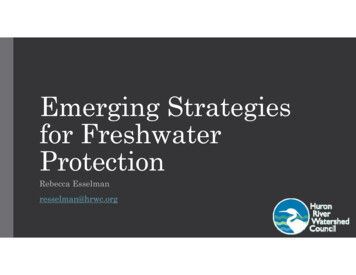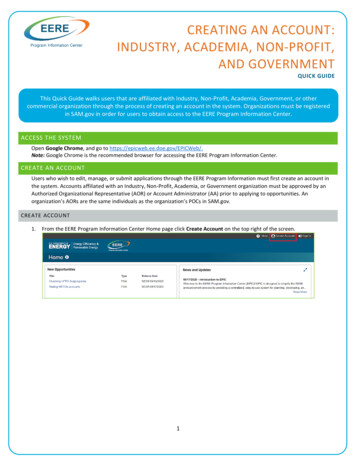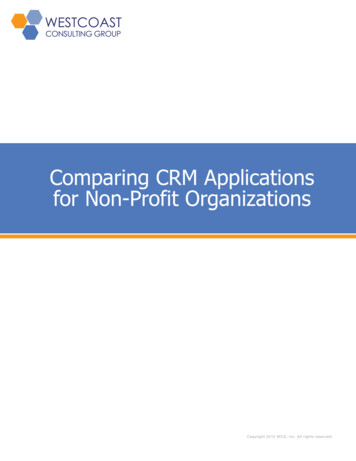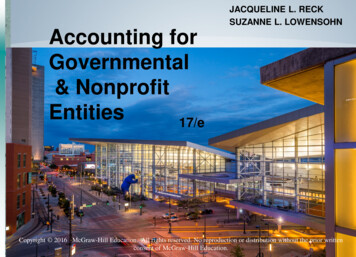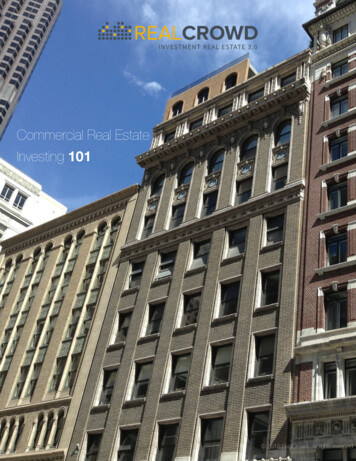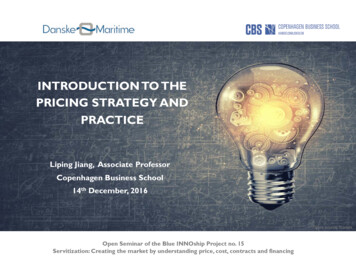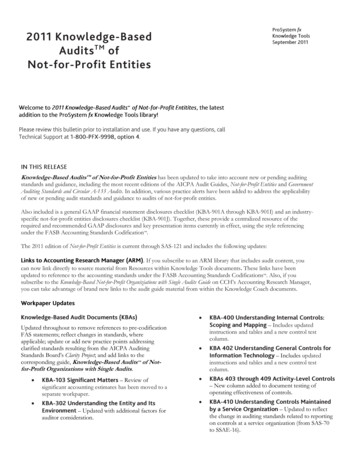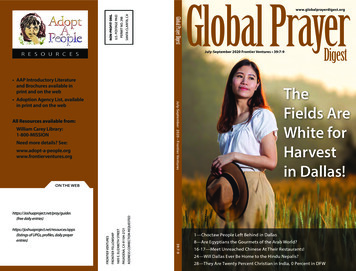
Transcription
Global PrayerPERMIT NO. 298SANTA CLARITA, CAU.S. POSTAGE PAIDGlobal Prayer DigestNON-PROFIT ORG.www.globalprayerdigest.orgJuly-September 2020 Frontier Ventures 39:7-9R E S O U R C E S AAP Introductory Literatureand Brochures available inprint and on the webTheFields AreWhite forHarvestin Dallas!July-September 2020 Frontier Ventures Adoption Agency List, availablein print and on the webAll Resources available from:William Carey Library:1-800-MISSIONNeed more details? DigestPASADENA, CA 91104-27211605 E. ELIZABETH STREET1—Choctaw People Left Behind in Dallas39:7-9FRONTIER (listings of UPGs, profiles, daily prayerentries)FRONTIER VENTUREShttps://Joshuaproject.net/pray/guides(free daily entries)ADDRESS CORRECTION REQUESTEDON THE WEB8—Are Egyptians the Gourmets of the Arab World?16-17—Meet Unreached Chinese At Their Restaurants!24—Will Dallas Ever Be Home to the Hindu Nepalis?28—They Are Twenty Percent Christian in India, 0 Percent in DFW
EditorialDear Praying Friends,Imagine yourself as a refugee oran immigrant in a new country.Everything seems strange to you; the people, how youpurchase groceries, everything. At first you feel unsure ofyourself, and you know you need help from the local people.As the years go by, others from your culture join you. Youbegin to form organizations to preserve your culture andyour past identity.At what point do you think people are most open to spiritualchanges? If you thought it was the earlier time, you are right.Time and again, believers have found that by reaching outto the unreached peoples in the West within a year of theirarrival, they are most open to change. Once they becomesettled, they try to resurrect the old ways.We are praying for the unreached peoples in Dallas-Ft.Worth (DFW) Texas this month. Be especially vigilant topray for recently arriving groups like the Rohingyas. We areespecially grateful for a team of researchers in DFW whoshared their information, helped us decide which groupsto cover, and wrote the background piece and nine dailyentries. There are many surprises in this issue, and you willbe praying for people groups we have never covered before.In Christ,Keith Carey, editor-in-chief, ormation:Free digital tools from Unreachedof the ayPrinted frontiers/subscribe.aspFor comments on content call626-398-2241 or emailkeith.carey@frontierventures.orgASSISTANT EDITORPaula FernWRITERSPatricia DepewKaren HightowerWesley KawatoBenjamin KlettDavid KugelChristopher LaneTed ProffittCory RaynhamLydia ReynoldsJean SmithAllan StarlingChun Mei WilsonJohn YtreusFeature of the MonthPRAY FORA Disciple-Making Movement forEvery People in Dallas-Ft. Worth(DFW)DAILY BIBLE COMMENTARIESKeith CareyCUSTOMER SERVICELois CareyLaurie RosemaGRAPHICSKeith CareyDavid GutierrezPRINTERYuli Color Reproduction Co., LTD.(Taiwan)WEB ayISSN 1045-9731Contents of the Global Prayer Digest 2020Frontier Ventures1605 East Elizabeth StreetPasadena, CA 91104Contents of this booklet may bereproduced if appropriate credit andsubscription information are given.Cover photo by iStockjat306.23
FREE Prayer Resources!PRAYER GUIDES!Download and print your own freecopies from Joshua Project's websitehttps://joshuaproject.net/pray/guidesFree daily eday/emailYou can also get the app by goingto the App Store or the Google PlayStore, and search for "Unreached ofthe Day"Joshua Project has much more!Research and daily prayer materialsfor UPGs.http://joshuaproject.net/Devotional IdeasHow can you make the most of thisprayer digest: Some people use it as asupplement to their regulardevotional time. Others enjoy reading andpraying around the dinner tablewith the entire family. We encourage you to gathermonthly with friends whoare involved in this prayermovement.Every day at the top of the pageyou’ll find the name of an unreachedpeople group for which to pray.Fellowship for Prayer StrategistsExcellent materials for those who areserious about guides/10-40 Window ReporterPrayer for nations of the 10-40Window using materials from currentnews sources.https://www.windowreporter.com/5
To Help You Pray BetteriStockmichaeljungThe Fields Are Ripe in America’s“Ethnic Hypergrowth” CityDallas-Ft. Worthwithout a meaningful witness. Yet there is “religious” growth. DFW is home tothe fourth largest Muslim community in America. Unused church buildingsare being remodeled as Buddhist temples with traditional Buddha statues andmeditation gardens.Indeed, the Metroplex of the 21st century is increasingly more diverse, moresecular, and more devoted to material success. The headquarter buildings of TexasInstruments, AT&T, Exxon-Mobil, American Airlines, and 21 other Fortune 500companies gleam in the Texas summer sun. If the Metroplex was its own countryits gross domestic product would be the 10th largest economy in the world. Tosustain the momentum, they highlight job growth and an affordable cost of livingto attract talent from around the world.A Tradition of Spiritual Challenges, Cover-Ups, and Economic GrowthFrom 1950 through the 1970s the Dallas-Ft Worth(DFW) metropolitan area was known as the buckle of“the Bible belt” that stretched from Texas to Florida inthe American south. Over seven and half million people live inthe 13-county area locally called the Metroplex. 246 newcomersarrive every day and since 2016 DFW has led the nation yearafter year in population growth. It consistently ranks as a topresettlement hub for the US Refugee Resettlement Program.With all this influx English is not the primary language spokenin a quarter of Metroplex homes. Immigrant growth in all itsforms is so significant the Brookings Institute described Dallasand Fort Worth as “ethnic hypergrowth” cities.Bible Belt No More?The association with the Bible Belt has faded from memory.Church attendance flattened in the 1970s and has not keptup with population growth. In 1990 Evangelical Protestantscould claim 1.4 million participants. While that number grewto 1.8 million by 2015 during that same period the overallpopulation almost doubled. While aging congregations struggleto maintain membership, secular society continues to growThe Metroplex is young, and youth are prone to misbehave. Dallas taught thedentist Doc Holliday how to gamble, made Bonnie and Clyde outlaw heroes,rocketed Ray Charles to a legendary R & B performer, and celebrated the city’sexcess in a primetime soap opera of the same name. Ft. Worth was the cattle andmeat packing town and home to Hell’s Half Acre—a famous red-light district thatattracted scores of Old West personalities until the 1920s. Also in the Roaring20s one out of three eligible men in Dallas were members of the Ku Klux Klan.Then in 1924 the Citizens League Against the Klan rallied 5,000 to protest theracist organization’s hold on local politics and the Klan lost its clout. After theGreat Depression the league gave way to the unelected Dallas Citizens Council ofbusiness elites that would steer Dallas politics for decades. Their goal was not toimprove the lives of citizens, but to keep out of negative newspaper headlines thatmight hamper business.Dallas and Ft. Worth competed for the affection of the state and the nation.Dallas developed growing financial markets and Ft. Worth invested in world classmuseums and cultural attractions while boasting of being home to the world’slargest seminary. Issues of racism were covered up and local city councils reformedpolicies just enough to give the appearance of social improvement and satisfybusiness leaders. The assassination of President John F. Kennedy in 1963 by LeeHarvey Oswald in downtown Dallas gave the city a proverbial black eye. Localsare quick to point out that the Marxist Oswald was not a hometown product,but a recent immigrant. The assassination spelled the end of the Dallas CitizensCouncil and spurred the Metroplex’s slow evolution into a modern urban hub.A Tradition of Ethnic DiversityDFW has always been ethnically diverse. The cities of north Texas wereestablished beginning in the 1840s, often at the site of Indian villages. Its earliestcontinued on next page67
iStockeyedearDallas-Ft. WorthWhite settlers were Germanand Swiss including refugees ofa failed French utopian society.As part of a former Spanishcolony, Mexicans were alreadya thread in the cultural fabric.Uptown Dallas, Deep Ellum,Little Egypt, and Joppa wereall originally large freedman’stowns of former slaves. TheJewish Temple Emanu-El wasfounded in 1873. Demographers even recorded 46 Chinese in Dallas in 1886. Inthe 20th century diversity increased.The Metroplex of the 21st century is home to over 350 groups with diverselanguage and cultural backgrounds. In step with the populace as a whole,immigrants are settling in the suburbs and spurring new growth away from centralurban hubs. According to DFW International, immigration accounts for virtuallyall of the increase in public school enrollment. Students from India make up thelargest body of international students at the four major local public universities.Likewise, many of these graduates stay. Twenty-five percent of the employeesin Richardson’s Telecommunications Corridor and the surrounding high-techindustry are from India. Many immigrants, like the 50,000 Igbo NigerianAmericans, come here fluent in English and versed in Western church culture.Others, like many in the even larger Vietnamese diaspora, begin their experiencelearning English, working minimum wage jobs, and becoming acculturated by trialand error.Many of these cultures have never heard a clear, culturally appropriate presentationof the gospel in their language. Immigrants from Buddhist and Hindu backgroundsask some of the same questions as educated Westerners. Questions such as, “Doesthe spiritual play a role in high tech, materialist society?” “Should ancient culturalmyths and religious traditions remain the basis for modern decision making?”The pastor in a church directly across the street from the Buddhist temple isuncomfortable reaching out to the monk. So too, the monk does not know howto approach this representative of a Western faith that seems so dominant. Yet allbelievers can bridge these cultural gaps by simply asking an immigrant what hisor her religious tradition teaches about sickness, marriage or helping the poor—whatever issue is at hand.Spiritual PotentialIt’s important to note that the Dallas-Ft Worth Metroplex is a global gateway cityto which God has drawn people groups without access to the gospel. From here8Dallas-Ft. Worththey reach back into their home as ambassadors of Texas’ entrepreneurial can-dospirit. Where Church Planting Movement (CPM) teams have reached refugeeswith the gospel, DFW’s newest residents discuss Bible stories with family membersback home via Skype and Facebook, and new congregations form. More than adozen trained disciple-making movement (DMM) and CPM teams are in place inthe region. The work is slow and the need for the Holy Spirit to act is ever evident.Historically, immigrant communities revive cities. May Dallas-Ft Worthexperience spiritual revival as Christ is praised in hundreds of languages andthe glory of His presence is exhaled back across the globe! Revival starts withrepentance. Lord, as representatives of the sins of city founders, politicians, businessleaders, and co-workers devoted to racism and self-aggrandizement – we repent.May the Lord grant DFW the spiritual capital and Holy Spirit endowed tenacity totransform this old Bible belt buckle into a hub for global evangelization.How You Can PrayThe people groups featured in this edition have been identified as some ofthe most unevangelized and strategic groups with a tangible presence innorth Texas. As you explore each people group ask God to orchestrate divineencounters in which believers inquire about the life and faith of neighbors fromAsia, Africa, and the Middle East.God is drawing the nations to DFW. Will His people embrace the call?Through these 31 days of intercession ask God to enrich the spiritual climateof the Metroplex in three vital ways: enable new workers to bless the unreachedin our midst, equip persons of peace to reach their communities, and empowera multiplying movement of new churches that multiply new churches.In praying Luke 10:2 for new workers ask God for translators, business peopleequipped to focus on ethnic markets, and gifted entrepreneurial servants who willcatalyze simple teams to enter the harvest to put the gospel in the hands of the city’snewest residents. The prayers of God’s people around the globe will enable the churchof DFW to commit to seeing that local unreached people groups will be reached.Onward for His glory,Thom MackenzieThom serves among the international community for the sending agency,Beyond, and teaches global literatures at Dallas Baptist University9
Josh 1:9, NLTThis is my command—bestrong and courageous!Do not be afraid ordiscouraged. For theLORD your God is with youwherever you go.Pray that the NativeAmericans in DFW will findhope, strength, and couragein Jesus Christ, their Savior.iStockajr images01DAYCHOCTAW PEOPLE INDALLAS-FT. WORTH (DFW)ALBANIAN TOSK PEOPLE IN DFWIn 1892CaptainPratt calledon Christianeducatorsto “killthe Indianand savethe man.”Twentieth century Bureau of Indian Affairs (BIA)policy adopted Pratt’s call to strip their “pagan”culture by prohibiting cultural dances and nativelanguages, Americanizing children at boardingschools, and assimilating Indians in urban centers.The outcomes were disastrous.The BIA Dallas Relocation Office moved Chito’sfather (a Choctaw) the 127 miles from Oklahomato Arlington, TX after his discharge from theVietnam War. Chito became the target of Indianjokes at his new school, and he dropped out.Every few years Chito organizes a small powwow.Most Native nations have lost too much of theircustoms to hold a tribal dance or ceremony on theirown. Modern powwows practice a homogenousblend of practices from different tribes. Thereare enough Native American groups in DFW tosupport the local KNON radio show, Beyond Bowsand Arrows. Most Choctaws and other NativeAmericans loosely observe a mix of tribal folkbeliefs, and long for a redeemer who can help them“save face.”Pray for the Choctaw to experience adoption as God’schildren with the dignity to serve as Christ’s ambassadors and high priests to other Native Americans whostruggle to find their place in the West.—DFW team10Drita feels at homeinspecting produceand folding cloth napkinsat her family’s Italianrestaurant in Carrollton,TX. Since her uncle’shealth began to deteriorate,Drita has become moreresponsible for managingthe business. Long hoursensure she has few socialcontacts outside her tightknit family. Following the Muslim tradition tomarry within the community, marriage wouldlikely mean becoming part of another family’srestaurant because most of the family ownedItalian restaurants in north Texas are operated byAlbanians. Devotion to work and family cloud herever drifting dreams.iStock/PikateseDAY02ps 90:17, NLTAnd may the Lord ourGod show us His approvaland make our effortssuccessful. Yes, make ourefforts successful!Pray that the Lord willestablish the work ofmissionaries’ hands, as wellas the immigrant groupstrying their best to earn aliving in a strange land.Drita considers the United States to be a“Christian nation,” though she is not sure what thatmeans. Instead of adapting to American cultureshe clings to her Albanian culture, her Tosklanguage, and her nominal Muslim beliefs. InTosk her name means “light,” the defining elementmissing from her daily life.Pray for the 2,200 Tosk Albanians like Drita who callNorth Texas home. As they work with their hands maythe Holy Spirit work in their hearts and open theirminds. Ask God to send believers in the restaurantindustry to build spiritual relationships with workingTosk families. Pray that families welcome the Light ofJesus and share it throughout the industry.—TA11
03DAYDAYPray for believers in DFW todo just this, and act upon it!Eritreanpeopleimmigratedfrom one ofthe poorestand mostdangerousplaces in theworld. Wars,drought, land destruction, lack of food production,and oppressive government, has resulted in theexodus of the most educated and skilled professionals. They are willing to make whatever sacrifices arerequired for the benefit of their posterity. This isthe story of immigrants in America.Eritreans in Dallas-Ft Worth (DFW) believefirmly that rearing their children is not primarilythe responsibility of the parents but of their entirecombined community. Consequently, they areadapting well to their new culture and country.They remain closely connected to one another.No matter where they are located in the UnitedStates their strong family ties tend to make theircommunities very strong. Eritrean-Americans arehard workers, contributing to economic prosperity.They have earned respect as the kind of immigrantsevery country could desire. For example, they havebeen honored by the Mayor of Dallas for organizing two national soccer tournaments.Pray that God’s blessings through Christ will help theseMuslims become all that God wants them to be. Praythat spiritual barriers will be broken, and they willreach back to their homeland for Jesus.—KH12Wolofpeoplein Dallasare not allimmigrants.Since manyAfricanslaves werefrom thesame region, some African-Americans have Wolofblood. But today we will focus on those who areimmigrants to Richardson, Texas from Senegal,West Africa.i tock/mazingmikaelYou know the saying, ‘Fourmonths between plantingand harvest.’ But I say,wake up and look around.The fields are already ripefor harvest.iStockdk photosjn 4:35, NltMUSLIM WOLOF PEOPLE IN DFWERITREANS IN DFW04Ps 138:1, NLTI give you thanks, O LORD,with all my heart; I willsing your praises beforethe gods.Pray that the Wolof peoplewill sing praises to the ONLYGod, the one who gave themlife and offers life to the full.In Dallas the Wolof are hard-working peopleemployed by governments as teachers and many arebusiness owners. Women often work as hairdressers, waitresses or study in universities.Retaining their own Wolof language helps maintain unity among them. They are a people knownfor their beauty. Much African art is sourced fromWolof people.Primarily Muslim, they continue to resist thegospel, despite the Christian influences in Dallas.Local churches have much potential to reach Wolofpeople, and to be instrumental in their understanding of what Jesus Christ has for them. These peoplefor whom Christ laid down his life could be veryinstrumental in reaching loved ones in West Africaif they embraced the Savior. Who will tell them?Pray that God’s people will make long-lasting, intentional contact with Wolof people in DFW that willresult in many disciples reaching their own people. Prayfor the Holy Spirit to anoint Wolof families to raiseup a generation of fruitful, multiplying witnesses ofChrist’s mercy and love.—KH13
DAYI bow before your holyTemple as I worship. Ipraise your name foryour unfailing love andfaithfulness; for yourpromises are backed by allthe honor of your name.Pray that the MuslimMoors will respond to God’sunfailing love by giving Himall their devotion.There aretwo verydifferentMoorishpeoples inDFW! Theyare eitherWhiteMoors(Moors of predominantly Arab descent who speakHassaniya Arabic) and Black Moors (Moors ofpredominantly African descent who speak Africanlanguages). The Black Moors have made their way tothe US seeking sanctuary from slavery and oppression, often at the hands of the White Moors. Theyhave brought their religion, their culture, and theirfears with them. They are known for their refusal tointeract with other ethnic groups in an attempt topreserve their traditional culture. This attitude hashindered their adjustment to life in the United States.Moors are known to be almost entirely SunniMuslim in their religion and culture. Black Moors,although Sunni Muslim, are not as committed.Efforts to reach Moors in DFW would need toinclude two separate outreaches.Pray that prayer teams will be raised up to begin breaking up the spiritual soil through worship and intercession.Ask the Lord to raise up a strong disciple-making movement among Moorish people in DFW, reaching familiesfirst. Pray that available Bible resources in Hassaniya,the heart language of White Moors, will find their wayto prepared hearts.—KH14MUSLIM MOROCCANS IN DFWWhat makestheMoroccans sospecial amongArabic speakingpeoples in DFW?The primaryreason is thelanguage. If youlook at a map of the Arabic speaking world, it startsin the west with Morocco, and ends in the east inIraq and Oman. As you might imagine, Arabic isdifferent throughout, though most people understand Egyptian Arabic, since it is the language ofArabic language media. Moroccan Arabic includeselements of the Berber/Tamacheq and Frenchlanguages. Some of their foods are different thanother Arabs. Moroccans have good reason to havetheir own cultural association in the Dallas area.However, most live in Plano and Richardson, nearother Arabic speaking communities.iStock barsikps 138:2, NLTMUSLIM MOORS IN DFWiStock/LorenzoT8105DAY06Os 138:3 NLTAs soon as I pray, youanswer me; you encourageme by giving me strength.Pray that the Moroccans inDFW will be given spiritualstrength and encouragementas they offer themselves asliving sacrifices to the Lordof lords.We will be praying for Moroccans for the samereason that we will pray for Algerian, Egyptian, andIraqi Arabs. These Muslims are highly unreached.Though Moroccans may have been in Texas longenough to be set in their old ways, they still need tohear that they need a savior.Pray for spiritual hunger that will drive these Muslims toseek and find the Savior. Pray for cultural and spiritualwelcomers among them to welcome Christ’s ambassadorsinto their community. Pray for a Moroccan Arabiclanguage disciple-making movement to flourish inRichardson and Plano.—KC15
DAYThe LORD will work outHis plans for my life—for your faithful love, OLORD, endures forever.Don’t abandon me, for youmade me.Pray for the Lord to workout His perfect plan for theAlgerian Arabs, and givethem grateful hearts forHis works.(This fictitious story illustratestruths about this people group.)“Congratulations toAlgerian student-athletesAmine, Badri, and Adel forreceiving the US NationalHonors Society awardsfor excellent academicachievement! In addition totheir exceptional academicaptitudes they are great basketball players for ourschool.” The President of Spring Creek Academy,a leading private high school located in Plano, TXwas presenting the awards. “Amine, I would likeyou to come up first and receive your award." Thehandsome six foot nine Algerian went up to thestage. After receiving his award, he stated, “It isnot just my sole effort that has made this possible. Iwould like to thank my parents, who went throughso much when they left Algeria, so my siblings andI could be here in the US. I’m also very indebted tomy teachers, coach, friends, and everyone who hasgiven me support!”There are an estimated 14,700 Algerians living inthe United States with a small population residing in Dallas. The majority are nominal SunniMuslims. They are usually hardworking, friendlypeople dedicated to their families.Pray that believers will develop lasting friendshipswith the Algerians so they can earn the right to beheard when they tell them about the powerful blessingsof Christ.—PD16MUSLIM EGYPTIAN ARABS IN DFW(This fictitiousstory illustratestruths about thispeople group.)Enjoyingtheambianceand flavor ofEgyptian cuisine at a fine restaurant in Dallas,Dan complemented the Egyptian owner. “This isthe best Egyptian food I have ever tasted! Howlong has your restaurant been open?” The ownerreplied, “It has been several years. I’m happy youlike the food!”iStockPeter Mullerps 138:8, NLTMUSLIM ALGERIAN ARABS IN DFWiStockRanta Images07DAY08is 19:21, NLTThe LORD will make Himselfknown to the Egyptians.Yes, they will know theLORD and will give theirsacrifices and offeringsto Him. They will make avow to the LORD and willkeep it.Pray for this prophecy tocome true in DFW thisvery decade!Estimates of the number of Egyptian immigrantsto the US are well over 800,000 with a fairlylarge number living in Texas, especially in theDallas area. The majority of Egyptian Americansare Christians who belong to Coptic, Protestantand Catholic churches. These Christians soughtasylum due to the high persecution they enduredin a country where the population is over 90percent Muslim. Egyptian Muslims form aminority in the US and usually isolate themselvesfrom Christian Egyptians. Most of them arevery dedicated to their Islamic beliefs. ManyEgyptians in the US are professionals, especiallyin the areas of engineering and medicine. Anumber have succeeded in opening restaurants.Pray that Egyptian believers will be willing tolovingly reach out to Egyptian Muslims. May theEgyptian Muslims come to feel Christ’s presence intheir lives and desire to accept and follow Him.—PD17
DAYDo not charge interestor make a profit at hisexpense. Instead, showyour fear of God by lettinghim live with you asyour relative.Pray for many in DFW toshow their fear of God byreaching out with Christ’sblessings to the Arab peoplesin their midst.ADRUZE IN DFWs anArabictranslator forthe USmilitary,Nasimsacrificedhis family and future during Iraq’s sectarian violence.While military personnel sported bullet proof vests,he relied on street smarts for protection. Thoughgranted priority status to immigrate to the US thewelcome he received was not warm. He enduredthreats and social isolation for years. Many fellowtranslators never were approved. He was resettledin Ft Worth’s Stop 6 community. Nasim managedto pick up odd jobs and found an apartment withother young refugees he could not trust. He wasafraid his roommates would learn of his interestin this Messiah and turn in his family members toIslamic extremists in Iraq. When his sister calls onSkype from a Baghdad café, he attempts to hide thefact that even though he cannot see the signs of waroutside, the conflict continues to trouble his soul.Pray that Jesus would heal the 27,000 Iraqis in northTexas from the trauma of war and family separation.May fathers find boldness to observe the teachings ofJesus and share stories from the Bible with their networkof family and friends. Ask the Father to send Arabicspeaking believers to bless young Iraqi families withHis truth.—TM18(This fictitious storyillustratestruths aboutthis peoplegroup.)All Hadriqknew isthat hewanted to date his classmate. What he didn’tknow is that, being a Druze, he was not allowed to date outside his faith. His search formore information about the Druze beliefs resulted in the instruction to read the Bible, theQur’an, and Buddhist texts also to get agood education.iStock/rzdeblev 25:36, NLtIRAQI ARABS IN DFWiStockajr images0910DAYps 118:5-6, NLTIn my distress I prayed tothe LORD, and the LORDanswered me and set mefree. The LORD is for me,so I will have no fear. Whatcan mere people do to me?Pray that the Druze in DFWwill be set free from sinand fear.The Druze are a Lebanese ethnic/religious community whose history began with a man whoclaimed to be God. Most still live in the MiddleEast, though some are scattered throughout UScities such as DFW. Religiously, they exist as astrange sect of Islam, though they believe onlyin an “inner, esoteric meaning” to the Qur’an.The Druze allow no conversation either awayfrom or toward their religion.In the US, there is a movement ofWesternization, especially among young people,who are having difficulties with Druze valuesand restrictions, and many are walking awayfrom this secretive religion.Pray for entire Druze families to embrace and follow the Christ. Pray that the Holy Spirit wouldpenetrate their hearts leading many into a disciplemaking movement.—BK19
DAYAnd how will anyone goand tell them withoutbeing sent? That is whythe Scriptures say, “Howbeautiful are the feet ofmessengers who bringgood news!”Pray for more “sent”believers to go to theKurds in DFW and raiseup Kurdish believers whowill disciple others inChrist’s ways.Everyonewants ahomeland theycan call theirown, a flag thatthey can salute,and a nationalanthem they cansing. Technicallythe Kurds have none of these since their homelandhas been dissected by Turkey, Iran, Iraq, Syria, andAzerbaijan. Missionary work in these countries isalmost impossible.However, many Kurds have migrated to the West,where they have opportunities to hear the gospeland follow Christ. Most of the 20,000 Kurds nowin the USA came as refugees between 1975 and2014, and many settled in the DFW area. Theybrought with them their culture (dress, diet, andlifestyle), their language (Kurmanji), and theirreligion (Sunni Islam). The Kurdish NationalCongress represents Kurds in North America whowant the younger generation to remember theirlanguage and culture. Kurdish families place a highpriority on education. Kurdish women typicallydo not wear Islamic veils. Almost none of them inDFW have put their faith in Christ.Pray that believers in DFW will make the effort tolovingly take the gospel to Kurds and teach them todisciple others. Pray that the Kurmanji-speaking Kurdsin the US be touched by the gospel and moved to bringit to Kurdish people everywhere.—AHS20MUSLIM PASHTUNS IN DFWAsateenager duringLaylatal-Qadr,the mostimportantnight ofRamadan,Marof hada vision of a pure white goat sacrificed for his clan.When the Soviets invaded, the hills where hisgrandfather’s herd grazed were taken over, so hefled to Pakistan. Without a work permit, Marofbegan serving at a
Global Prayer www.globalprayerdigest.org . business elites that would steer Dallas politics for decades. Their goal was not to . Jewish Temple Emanu-El was founded in 1873. Demographers even recorded 46 Chinese in
